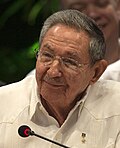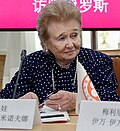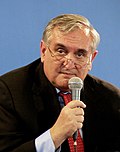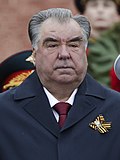| Name | Image | Position | Date | For |
|---|
| Vladimir Vladimirovich Putin |  | President of Russia | 8 June 2018 | Recognition of President Putin's long-term commitment to encourage the development of good-neighborliness and comprehensive strategic partnership of cooperation between Russia and China. [4] |
| Nursultan Nazarbayev |  | Former President of Kazakhstan | 28 April 2019 | China proposed the initiative of building the Silk Road Economic Belt, which received an enthusiastic response and solid cooperation from the first President Nazarbayev and all sectors of Kazakh society. [9] He also enhanced the vigorous development of the Shanghai Cooperation Organization and the Conference on Interaction and Confidence-building Measures in Asia. |
| Raúl Castro |  | First Secretary of the Communist Party of Cuba, Former President of Cuba | 29 September 2019 | Raúl Castro has been supporting China to play a greater role in international and regional affairs. He is also an important founder of China–Cuba relations, an active advocator and promoter of China-Latin America relationships. [10] |
| Maha Chakri Sirindhorn |  | Princess Royal of Thailand | She has made irreplaceable and outstanding contributions to the development of China–Thai relations by gaining a deep understanding of China, actively fostering traditional Chinese culture and spreading China–Thai friendship. She's also deeply concerned about the Chinese people and was the first to lend a helping hand after the Wenchuan and Yushu earthquakes and other major natural disasters. [11] |
| Salim Ahmed Salim |  | Former Prime Minister of Tanzania | Salim has made outstanding contributions to the restoration of China's legitimate seat in the United Nations. He always advocated that China and Africa should continuously strengthen friendly exchanges. [12] Salim would have loved to receive the award in person, but was unable to come to China for health reasons. Therefore, his daughter attended the award ceremony instead. |
| Galina Veniaminovna Kulikova [ ru ] |  | The first vice-chairman of Russian-Chinese Friendship Association [ zh ] | In 1989, she was elected as the First Vice-president of the Russian-Chinese Friendship Association and went to work at the Russian Embassy in China. Kulikowa has always been committed to developing friendly relations with China and has made outstanding contributions to the promotion of Sino–Russian people-to-people diplomacy. [13] |
| Jean-Pierre Raffarin |  | Former Prime Minister of France | As Prime Minister of France, Raffarin insisted on visiting China as scheduled during the SARS outbreak and gave great political and emotional support to the Chinese people. He attended the first "Belt and Road" International Cooperation Summit Forum and actively contributed to the objective understanding of all sectors in France and Europe in the "Belt and Road" cooperation. [14] |
| Isabel Crook |  | Educator | Isabelle Crook worked at Beijing Foreign Studies University for half a century and was a pioneer in the teaching of English and educational reform in the new China. [15] She trained a large number of foreign language talents for the new China and made outstanding contributions to the Chinese education. |
| Norodom Monineath |  | Cambodian Queen Mother | 6 November 2020 | Norodom Monineath has been actively involved in the cause of Sino–Cambodian friendship and has witnessed the development of the new China. [16] She has special feelings for the Chinese people and actively supports exchanges and cooperation between the two countries in various fields. |
| Nguyễn Phú Trọng |  | General Secretary of the Communist Party of Vietnam | 31 October 2022 | Nguyễn Phú Trọng is steadfast in Marxism and in maintaining the traditional friendship between China and Vietnam, he is also the one who guides and promotes the China-Vietnam Comprehensive Strategic Cooperative Partnership in the new era. [17] |
| Emomali Rahmon |  | President of Tajikistan | 5 July 2024 | First friendship medal awarded in a foreign country. It was awarded in a special arrangement to express the Chinese people’s friendly feelings towards President Rahmon and the people of Tajikistan. [18] |
| Dilma Rousseff |  | Chairwoman of the New Development Bank, Former President of Brazil | 29 September 2024 | Dilma Rousseff became the first woman to serve as President of Brazil, during which she cultivated strong relations with China. Following her presidency, Rousseff was appointed as the head of the New Development Bank, where she has played a key role in promoting cooperation and exchanges between Brazil, China, and other BRICS nations. Her leadership in this role has been noted for its focus on strengthening ties within the BRICS framework. [19] |













